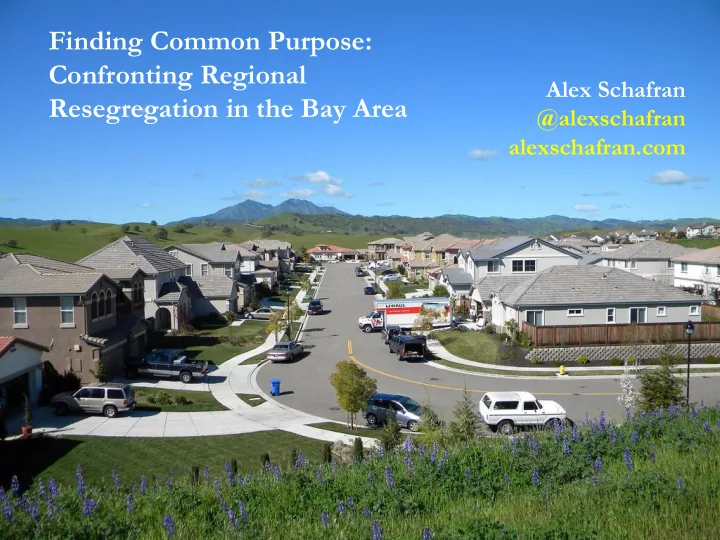

Finding Common Purpose: Confronting Regional Alex Schafran Resegregation in the Bay Area @alexschafran alexschafran.com
Understanding Resegregation 1. Really segregation 2.0 • A new kind of segregation • Not your grandparents segregation, but it is still segregation • Being trapped v. moving too often and too far 2. Both kinds of segregation still exist, and operate together. One does not replace the other 3. Does not imply segregation desegregation resegregation 4. Integration and (re)segregation are not opposites. Antioch is locally integrated, but regionally segregated Why not just talk of inequality, housing crises, etc.? The answer is race.
1. How we talk about this matters.
2. We need to recognize the new geography of the Northern California, and not plan for the region that was, or that might have been
Postwar ghettoized segregation: Bay Area 1970 NH Whites NH Blacks Hispanics Source: NCDB at 2000 tracks via UC Data
Mobile Segregation? African Americans in San Francisco and San Joaquin Counties, 1970- 2008. Source: Rand CA via US Census 125,000 100,000 75,000 50,000 25,000 0 1970 1972 1974 1976 1978 1980 1982 1984 1986 1988 1990 1992 1994 1996 1998 2000 2002 2004 2006 2008 San Francisco County San Joaquin County
Places with: • 50% growth • 5000 new residents • 1990-2010 Source: US Census SF 1, 1990, 2010
3. This means transportation matters as much as housing. So does higher education. Large scale spatial planning with a 21 st century progressive ethics?
• BART to Vallejo and Brentwood • ACE, really? Trains? • I-80 corridor • Ferries • New Towns? Gilroy, Travis, Mountain House/Tracy/ Stockton • Tech? • Concord NWS w/CSU, Stockton State
4. Our number one collective priority must be making more things possible
This means prioritizing politics, not policy
SB50 must be less divisive than SB 827. More CASA-style politics (even that can get better).
UBI in Stockton. As much about the politics of innovation and reframing the discourse around Stockton than whether the policy works. This makes sense.
5. Protection Preservation Production
How to meet the needs of 6. Sacramento, anyone? more people in California, while at the same time respecting fundamental limits on our tax dollars and natural resources is one of the inexorable challenges we face. This Urban Strat egy begins to meet that challenge. It gives focus to thousands of individual decisions which will affect California' s cities and suburbs by directing state and local governments toward a common purpose : the revitalization of existing cities and the sound management of new urban development .
A human settlements strategy? A green new fiscal deal?
7. Restorative Justice and a new social/spatial contract
Recommend
More recommend